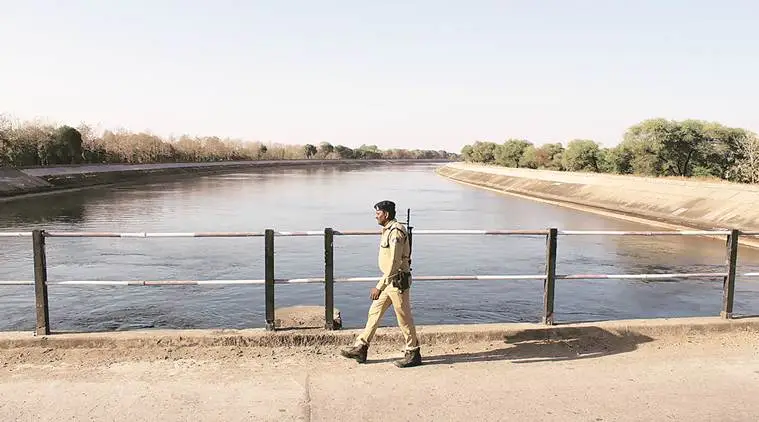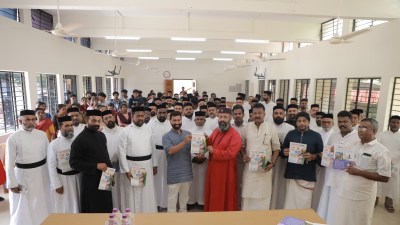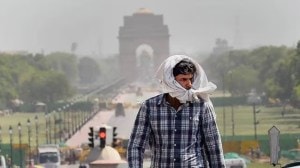- India
- International
Treading water: A day in the life of a constable at Narmada Main Canal in Gujarat
A part of the force assigned to bar farmers from illegally drawing Narmada water, Patel says he has never seen levels this low in 5 years of deployment.
 Patel patrolling the Narmada canal at Baroli village. (Source: Express photo by Javed Raja)
Patel patrolling the Narmada canal at Baroli village. (Source: Express photo by Javed Raja)
An assault rifle slung across his shoulder, Suresh Maganbhai Patel, 31, patrols the bank of the Narmada Main Canal at Baroli village in Gujarat’s Narmada district this scorching Tuesday afternoon. There is a stillness in the air, a far cry from the apprehensions and frenzied activity of earlier in the day, when there were fears of a protest by farmers.
Facing an acute water crisis, the Gujarat government has barred farmers from drawing Narmada water for irrigation since March 15. Patel is part of a nearly 150-strong constabulary force of the State Reserve Police (SRP) tasked with carrying out the government orders, from the main canal’s starting point at the Sardar Sarovar dam at Kevadia through its 450-km journey right up to Gujarat’s border with Rajasthan.
Today, in anticipation of the farmers’ protest, Patel, three of his colleagues, and a team of the local police were rushed to Baroli village, in central Gujarat’s Nasvadi taluka, at 8 am.
At 2 pm, with still no sign of the protesters, Patel phones his superior and passes on his precise location, “13.200 km”, the exact distance from the Sardar Sarovar Dam to the point of origin of the main canal. He also provides an update — “the situation is normal” — and adds that no rally has passed by yet.
As he walks on, Patel says he empathises with the farmers. “There is very little water flowing through the canal. In the past five years that I have been deployed here, I have not seen water levels this low,” says Patel, a constable with the SRP.

In January, the state government had directed farmers not to sow summer crops as they would not be allowed to draw water from the canal after March 15.
Yet, several farmers, left with no other livelihood option and in the hope that the government would reverse the order, went ahead and sowed crops. Those along the main canal hoped the ban wouldn’t affect them and that they would continue to draw water as they always did — illegally, using diesel pumps that drew water from the canal through PVC pipes.
But the Sardar Sarovar Narmada Nigam Limited (SSNNL), the nodal agency for the dam, has decided to strictly enforce the government order.
The SSNNL had hired the services of the SRP five years ago to guard the canal round the year, but this year, the authorities have directed the force to remain extra vigilant and tackle any law and order situation likely to emerge from farmers flouting the ban.
Patel says his job is only to ensure that the water is not illegally drawn, not remove pipes and generators along the canals.
“SSNNL officials remove pumps. And if there is a clash when SSNNL officials come to do that, we step in. Also, if we find water getting stolen from the canal, we catch the offender and hand him over to the local police. Barring a couple of minor incidents, there has been no big clash,” says Patel.
The SRP personnel, who are posted at the dam site in Kevadia and along the canal, work in shifts, says Patel, who joined the force in 2008, three years after his Class 12 exams. He first tried his hand at farming, he says, before appearing for the police recruitment exam and getting selected for the armed unit.
Patel says his initial years with the SRP, before the force was deployed at the dam, were filled with uncertainty due to constant transfers. “We struggled with food and accommodation. We would be sent wherever there were law and order problems. We would sleep anywhere and eat just about anything. But my life changed about five years ago when the SSNNL hired us. Now we are deployed only along the canal or at the dam site. My wife and two sons live in the government quarters at Kevadia town. We have good facilities compared to my village in Dahod,” says Patel, his eyes fixed on the road along the canal.
As the day progresses, it becomes clear that the protesters aren’t turning up. Patel walks towards a tree where pots of cold water have been placed on stands for passersby, and two villagers sell bidis and snacks from pushcarts. He is joined by the local policemen, numbering over a dozen, who have also been deployed here since morning.
“Paristhiti toh kharab lagta hai. Ye saal sabse kharab lag raha hai (The situation is quite bad and this year seems to be the worst),” says Patel.
Joining the conversation, his colleagues Amar Singh Vasava, Mehul R Vasava, and Gitesh Rathod admit that they don’t interact much with the locals. “We don’t know if they like us, but it doesn’t affect us. We are here to perform our duty,” they say.
The men also claim that the deployment at the dam and along the canal has taught them a “big lesson” — of how precious water is. “I come from Limkheda in Dahod where water scarcity is worsening every year. The situation is so bad there that there is no water for summer crops,” says Patel.
As the sun begins to set, Patel and his colleagues hop onto a police jeep and head back to town. “We may come back here tomorrow or may be deployed somewhere else,” shrugs Patel.
Apr 26: Latest News
- 01
- 02
- 03
- 04
- 05








































